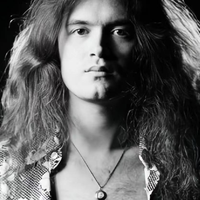
Glenn Hughes
Glenn Hughes, a native of Cannock, England, absorbed all kinds of influences, including early British hard rock, The Beatles, and, most importantly, American soul and R&B. The sleek Motown sound from Detroit and the gritty Stax/Volt sound from Memphis also left their mark on him. Glenn Hughes first found success in the early ‘70s with the band Trapeze, before joining Deep Purple in 1973 during a pivotal lineup change that introduced him and David Coverdale to the group. Despite initial skepticism, the revamped band silenced critics with the release of “Burn” (1974), a powerful album that revitalized Purple’s sound and remains a classic. During this era, the band headlined the iconic California Jam in front of over 300,000 fans, toured the world aboard their private jet, The Starship, and released two more studio albums, “Stormbringer” and “Come Taste the Band”, before disbanding in 1976. Glenn’s first solo album, “Play Me Out”, was released in 1977. He joined former Pat Travers guitarist Pat Thrall to form Hughes/Thrall, which released an acclaimed self-titled album in 1982. Throughout the ‘80s and ‘90s, Glenn Hughes made countless guest appearances (both credited and un-credited) as a vocalist, bass guitarist or songwriter on other artists’ albums. The endless list includes, among others, Gary Moore, John Norum, and Tony Iommi of Black Sabbath. Since 1992, Glenn Hughes has started a prolific solo career with a dozen studio albums where he explored all the different sides of his songwriting and influences: from hard rock to funk and more contemporary sounds. He collaborated – among others – with such musicians as Chad Smith, Dave Navarro, John Frusciante, and many others. Glenn Hughes also founded, or took part in, some amazing musical alliances such as California Breed (with Jason Bonham and Andrew Watt), Black Country Communion (with Joe Bonamassa) and The Dead Daisies.
